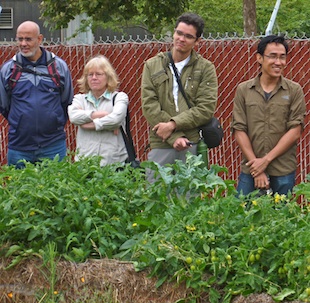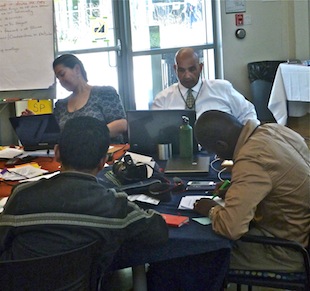
Rida Sherif (left) with Nancy Peluso, Environmental Science professor and other ELP participants (Photo: Karlina Wu)
The future of the country’s nature and wildlife is looking brighter after two Libyan environmentalists, full of ideas on how to change current attitudes, have been trained on effective leadership in the environment sector.
Two Libyan candidates, Khaled Ben Halim and Rida Sharif, beat international competition when they were chosen for the the Beahrs Environmental Leadership Programme (ELP). This year was the first when any Libyan had applied, and there were six candidates from the country.
The programme, run by the University of California in Berkeley, is designed to boost the effectiveness of professionals who work with the environment and who are in the middle of their careers.
“Sustaining natural resources in post-conflict nations is a major priority for the College of Natural Resources,” said ELP programme co-director, David Zilberman, “and we are very eager to support Libya’s future environmental leaders.” The course included modules on resource management and global warming as well as workshops on negotiation and organisational management.
Ben Halim works in conservation and animal welfare, supporting both wild and domestic animals, and is involved in a scheme to rehabilitate Tripoli Zoo, which lost many animals during the revolution.
Ben Halim hopes the ELP training will help him improve the attitude of Libyans towards animals. “I truly believe that you can judge a society by the way it treats animals. Until all life is respected, a society cannot be considered enlightened,” he said.
Sharif is in his final year of a forestry PhD and specialises in how improved forest management can impact on desertification.
“Trees are important to manage desert encroachment and sand storms,” said Sherif, “sand dunes form and cause road closures, traffic accidents, loss of limited fertile soil, and various diseases, especially respiratory ailments.” The ELP training will, he hopes, help him establish an NGO to work on preserving existing forests and natural vegetation, and planting new trees around the country.
“Here we have two passionate advocates, armed with new context, contacts and inspiration, who will return to their country to provide indigenous solutions,” said Ethan Chorin, Director of the Berkeley Research Group which part-funded Ben Halim and Sharif’s places on the course. He added that ELP provided context for environmental activism and was an important avenue for making change.

ليست هناك تعليقات:
إرسال تعليق